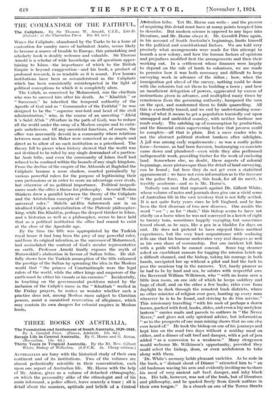THE COMMANDER OF THE FAITHFUL.
The Caliphate. By Sir Thomas W. Arnold, C.I.E., Litt.D. (Oxford : at the Clarendon Press. 10s. 6d. net.)
Wns;N: the Caliphate, abandoned by the Turks to be a bone of contention for sundry races of turbulent Arabs, seems likely to become a source of trouble to Europe, this painstaking and scholarly book is doubly welcome and valuable. Sir Thomas Arnold is a scholar of wide knowledge on all questions apper- taining to Islam—the importance of which to the British Empire is beyond exaggeration—and his book, a product of profound research, is as readable as it is sound. Few human institutions have been so misunderstood as the Caliphate which has been consistently misinterpreted in the light of political conceptions to which it is completely alien. The Caliph, as conceived by Mohammed, was the chieftain who was to succeed him after his death. As " Khalifah " or " Successor," he inherited the temporal authority of the Apostle of God and as " Commander of the Faithful " he was designed to be the " supreme war-lord and head of the civil administration," who, in the course of an unresting " Jihad fi 's Sahli Allah " (Warfare in the path of God), was to reduce all the world under the sway of a Moslem empire and to extir- pate unbelievers. Of any sacerdotal functions, of course, the office was necessarily devoid in a community where relations between man and his Maker were conceived as so simple and direct as to allow of no such institution as a priesthood. The theory fell to pieces when history showed that the world was not destined to be ruled by any single descendant of a particu- lar Arab tribe, and even the community of Islam itself had refused to be confined within the bounds of any single kingdom. From the decline of the empire of the Abbasids at Baghdad the Caliphate became a mere shadow, courted periodically by various powerful rulers for the purpose of legitimizing their own pretensions or in order to score an advantage over rivals, but otherwise of no political importance. Political insignifi- cance made the office a theme for philosophy. Several Moslem thinkers drew a parallel between the theory of the Caliphate and the Aristotelian concepts of " the good man " and " the universal ruler." Shiliab ud-Din Suhrawardi saw in an idealized Caliph a materialization of the Platonic philosopher- king, while Ibn Khaldfin, perhaps the deepest thinker in Islam, and a historian as well as a philosopher, seems to have held that as a political institution the office had ceased to exist at the close of the Apostolic age. - By the time the title was appropriated by the Turkish royal house it had long been the prey of any powerful ruler, and from its original intention, as the successor of Mohammed, had assimilated the content of God's secular representative on earth. Professor Arnold finally exposes the myth of Mutawakkil's abdication in favour .of Sultan Sethi'. He skil- fully shows how the Turkish assumption of the title enhanced the prestige of the Sultan by spreading the idea in the Moslem world that " the princes of Constantinople were the legal rulers of the world, while the other kings and emperors of the earth must be either his vassals or his enemies." Incidentally, in touching on the governmental problems raised by the inclusion of the Caliph's name in the " Khutbah " recited in the Friday prayers, he makes us wonder whether such a practice does not, among Moslem races subject to Christian powers, assist a casuistical reservation of allegiance, which may contain its own dangers for colonial empires in Moslem lands.










































 Previous page
Previous page